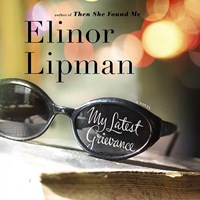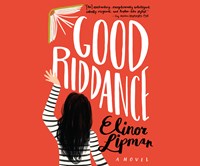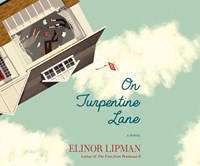Rediscovering My Own Book on Audio
By Elinor Lipman
How could it be that an audio addict such as myself shrank from listening to her own books?
It wasn’t that I already knew the stories or had better things to do; it was fear of all that might be cringeworthy, such as mispronounced words and voices that failed to embody my characters, their tones different from the ones in my head. It was especially painful to hear my sympathetic male characters reduced to (you know what I’m talking about!) gruff baritones that lacked nuance and warmth, adopted apparently to signal: man speaking .
Truth be told, there was one word that lowered the boom, in an early recording of THE INN AT LAKE DEVINE. What had been so off-putting was a seriously mispronounced Yiddish word: machatunim (meaning, the family you marry into) which was rendered as if an Irish surname: McCOOT-i-num. I might’ve recovered if it had been a one-off, but the word popped up often, fondly adopted as a punchline by the romantic hero of the book, a gentile. Did the narrator not have a Jewish friend to consult? Or me?
But then, thankfully, along came Dreamscape Audio last fall offering to re-record THE INN AT LAKE DEVINE. At last it would be digitized and downloadable. I requested as its narrator Piper Goodeve who’d recorded my last novel, MS. DEMEANOR, to raves (where it counted, not from the abstaining author). Within days, Piper sent me a list of words, surnames, and places she wanted to double-check, including Abodeely, Tardieu, Nagy, Tookie Boutcelis, Callie Kochanek, Bonnie Valluzzi, Forestall, Sonny Cirrell. As for any Yiddish words, I was not to worry! She’d consult the website Forvo, her friend (“the incredible narrator,” she wrote) Gabra Zackman, and Gabra’s mom.
We weren’t done yet. Most gratifyingly, and probably because of my bellyaching about the earlier version, Dreamscape sent me the finished audio for review. I began listening with the usual wariness: Will Piper be my first-person narrator, Natalie Marx, starting at twelve, then into adulthood? I hit play , less for pleasure than as an over-protective director. I knew the story inside out, didn’t I? I could listen with one ear, or so I thought.
Before the opening chapter ended, I found myself—how embarrassing!—spellbound. How could I be hooked on my own sentences! Hadn’t I written them? Had I forgotten the ending? No and no. It only took minutes before I stopped listening with an author’s critical ear, and was its captive.
There were surprises in a book I hadn’t visited since reading page proofs twenty-seven years before. It wasn’t that I’d forgotten the plot or the characters, but I'd forgotten how much of my life I’d put into THE INN AT LAKE DEVINE. Besides its setting in Newton, Massachusetts, where I used to live, here were my likes, my dislike, my grudges, my slights; meals I cooked, the anti-Semitism spoken aloud. It was an unexpected visit to my youth and the inside of my head in the 1960s and ’70s. There was Garb Drug, Franco’s Market, Purity Supreme, Valle’s Steakhouse, Pappagallo on Newbury Street. I startled myself with how much I hadn’t fictionalized.
Would I have called it an autobiographical novel? In part. My family was turned away from a Vermont hotel in 1961, with a letter warning, “The people who return year after year, and feel most comfortable here, are Gentiles.”
I didn’t want to do anything else but root for Natalie, who—unlike me—challenged the owner of the restricted hotel that had turned her family away. Notes? Edits? Corrections? I found one mispronounced entrée, and what I viewed as a minor matter of emphasis. Also “ shmegegge ” was contracted, a syllable missing due to a blip in the recording. Hardly a fix needed, only applause.
I wrote to my Dreamscape contact, “Brava! I loved this book more than a modest author should admit! As I’ve now said many times, Piper is the perfect choice and the perfect Natalie Marx. Sigh. So wonderful. I didn’t want it to end.”
Piper knows all this; knows what she did for me. We met for the first time in New York City on the book’s release day. She had asked me when she got the job if it was all right that she wasn’t Jewish. Without hesitating, I’d said yes, and especially now it felt bashert , a collaboration foretold.
A waitress took our picture. I sent it to Dreamscape and wrote, “I’m on the left. And at long last, I have Natalie Marx on my right.”
FEB/MAR 2024
©AudioFile Magazine 2024
Talking with Elinor Lipman
Elinor Lipman has been asked the darnedest questions while out on tour to promote I CAN’T COMPLAIN, her first collection of personal essays. “They want to know: ‘What is the first line of your match.com profile?’ or ‘Are you dating anyone?’ What am I supposed to say? ‘Oh no, that’s private?’” laughs the author, who is best known for perspicacious funny novels featuring sharp social satire and happy endings. “I blush, but I figure I asked for it.”
Lipman’s most recent novel, THE VIEW FROM PENTHOUSE B, was published simultaneously with the essays, leading to what Lipman’s editor calls a “conversation between the books” that is revelatory and moving. The essays, as thoughtful and witty as her novels, address everything from online dating to holding grudges and include several about the premature death of her beloved husband, Bob, and her subsequent widowhood.
As it happens, the novel, told in the first person, is about a widow. “Before Bob’s illness and death, I had been working on a boarding-house recession comedy,” explains Lipman. “When he died, I dumped 65 pages, set the story in the first person, and made the protagonist a widow. But I said to myself, ‘It’s not me, because I’m a new widow, and she has been widowed for two years.’ Of course, it takes so long to write a book that I caught up to her!”
When Jeff Golick, publishing director of Dreamscape, acquired the audiobook rights to both books--“Thank you, thank you, Jeff,” says Lipman--she asked to be the one to narrate the essays. The experience, she reports, was “easier than recording a novel, which was very, very hard work. You have to differentiate characters!” [She has narrated two novels.] This time, other than choking up while reading of Bob’s death--the director kept that take in--she had a delightful time. Admittedly, it turns out that she uses lots of foreign words in her writing that she does not actually know how to pronounce. “We would practice, and then the director would say, ‘Okay, now say it as if you’re not trying so hard.’ And another thing, if you decide that you want to edit a little bit as you record--not a lot, just change a few words--well, too bad. You might think you’re getting away with it, but the proofreader always catches what you did and wants to litigate it!”
All of which makes her even more appreciative that actress Mia Barron narrated PENTHOUSE B. Several novels ago, Lipman asked to participate in choosing the narrator of her work. She was sent a CD with five voices--“and when I got to Mia’s, I said ‘hold the presses, this is it.’” She appreciates Barron’s clear voice and “non-actressy” approach. The newest novel is the third of Lipman’s books that Barron has narrated.
Lipman describes herself as a reading, not a listening, person--“although the thing is that I keep wanting to change that.” She’s inspired by her listening public, including a fan who recently sent her an email after hearing Penthouse B: “I have listened to it whilst clearing pine needles from our property, doing the laundry, spring- cleaning the house, and late at night in the dark under the comforter. Wonderful and marvelous, this, adding to my daily appreciation and general contentment.” “It made me think, why aren’t I constantly listening to a book when I’m doing the dishes or making the bed?” asks Lipman. “I absolutely mean to. The problem is that I daydream a lot. When I am driving or walking or chopping onions, I’m thinking: ‘What is my character doing next?’”
Such planning is vital, for as Lipman relates in the essay “No Outline,” she doesn’t plot her books ahead of time. “I have an opening line or a premise, and then I sit back and ask, ‘Am I curious enough about what happens?’” The story that results always surprises her, whether it’s the unexpected attractions of a traveling fudge salesman or the benefits of acting as a pretend girlfriend.
“And that’s part of the fun of it,” she laughs. “As Robert Frost said, ‘No surprise for the writer, no surprise for the reader.’”--Aurelia C. Scott
AUG/SEP 13
© AudioFile 2013, Portland, Maine














